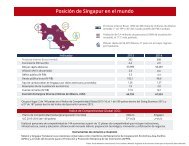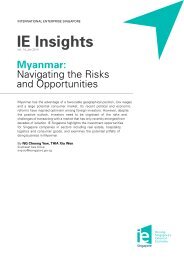basic-guide-to-exporting_Latest_eg_main_086196
basic-guide-to-exporting_Latest_eg_main_086196
basic-guide-to-exporting_Latest_eg_main_086196
You also want an ePaper? Increase the reach of your titles
YUMPU automatically turns print PDFs into web optimized ePapers that Google loves.
District Export Councils assist in many of the workshops and seminars on <strong>exporting</strong>that are arranged by the U.S. Commercial Service offices, and they also sponsor theirown, including Export University. District Export Council members may also providedirect, personal counseling <strong>to</strong> less experienced exporters by suggesting marketingstrat<strong>eg</strong>ies, trade contacts, and ways <strong>to</strong> maximize success in overseas markets. You canobtain assistance from District Export Councils through the U.S. Commercial Serviceoffices that they are affiliated with.State and Local GovernmentsState, county, and city economic development agencies; departments of commerceor development; and other government entities often provide valuable assistance <strong>to</strong>exporters. The assistance offered by these groups, many of them operating under adepartment of commerce or economic development or similar, typically includes:• Export education. Helping exporters analyze export potential and introducingthem <strong>to</strong> export techniques and strat<strong>eg</strong>ies, perhaps in the form of group seminarsor individual counseling sessions• Trade missions. Organizing trips abroad <strong>to</strong> enable exporters <strong>to</strong> call on potentialforeign cus<strong>to</strong>mers (see also Chapter 6)• Trade shows. Organizing and sponsoring exhibitions of state-produced goodsand services in overseas marketsFinancial InstitutionsMany U.S. banks have international departments with specialists who are familiarwith specific foreign countries and various types of commodities and transactions.Large banks located in major U.S. cities <strong>main</strong>tain correspondent relationships withsmaller banks throughout the country. And with banks in many foreign countries,they may operate their own overseasbranches, providing a direct channel <strong>to</strong>foreign cus<strong>to</strong>mers.International banking specialists ar<strong>eg</strong>enerally well informed about exportmatters, even in areas that fall outsidethe usual limits of international banking.Banks frequently provide consultation andguidance free of charge <strong>to</strong> their clientsbecause they derive income from loans<strong>to</strong> the exporter and from fees for specialThe U.S. Commercial Serviceworks closely with state and localgovernments as well as privatepartners. We offer a full range ofexpertise in international trade,marketing, and finance.services, such as letters of credit and other kinds of funds transfer. Many banks alsohave publications available <strong>to</strong> help exporters. These materials are often devoted <strong>to</strong>particular countries and their business practices, and they may be a valuable <strong>to</strong>ol forfamiliarization with a foreign industry. Also, large banks frequently conduct seminarsand workshops on letters of credit, documentary collections, and other bankingsubjects of concern <strong>to</strong> exporters.52U.S. Commercial Service • A Basic Guide <strong>to</strong> Exporting





